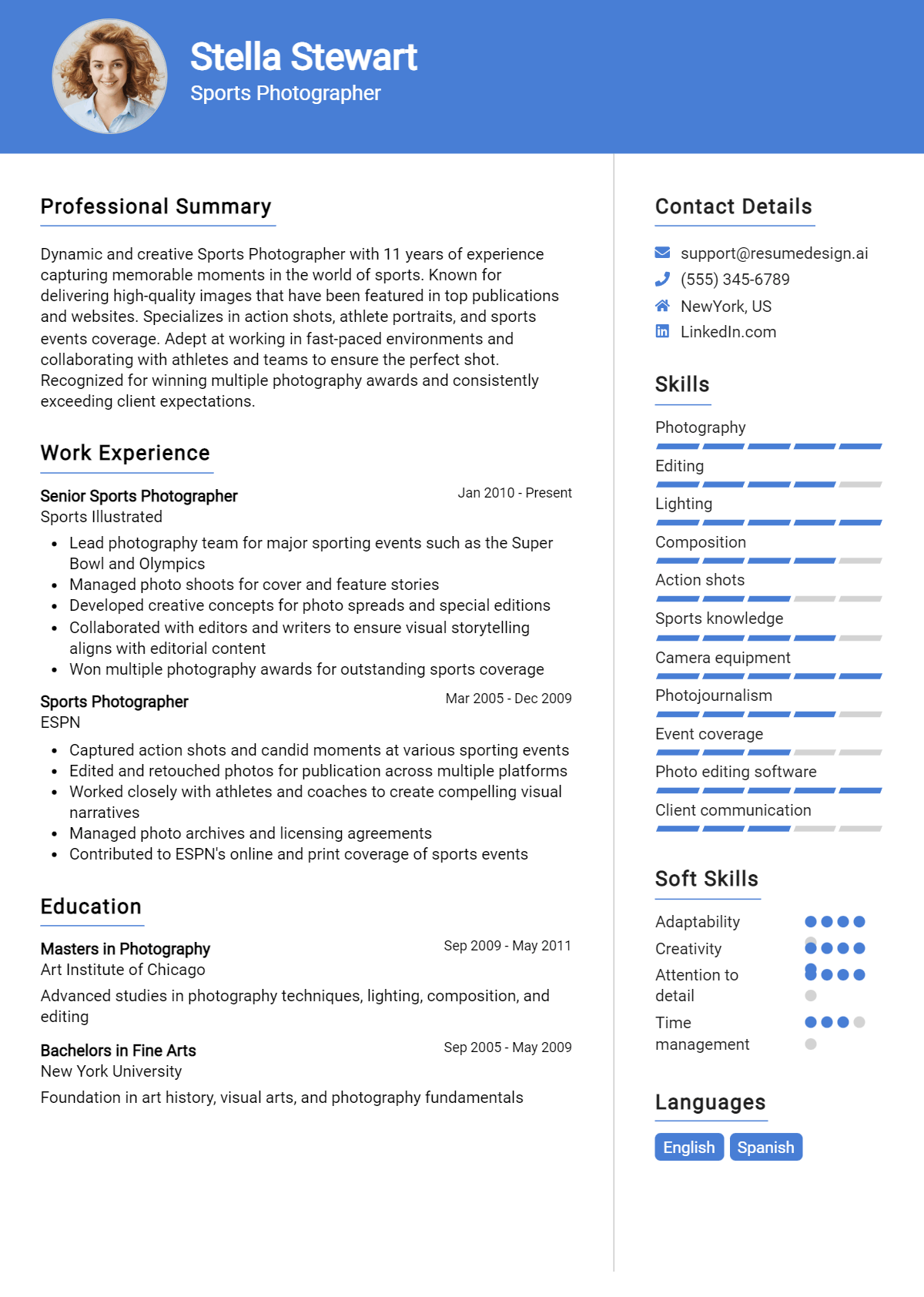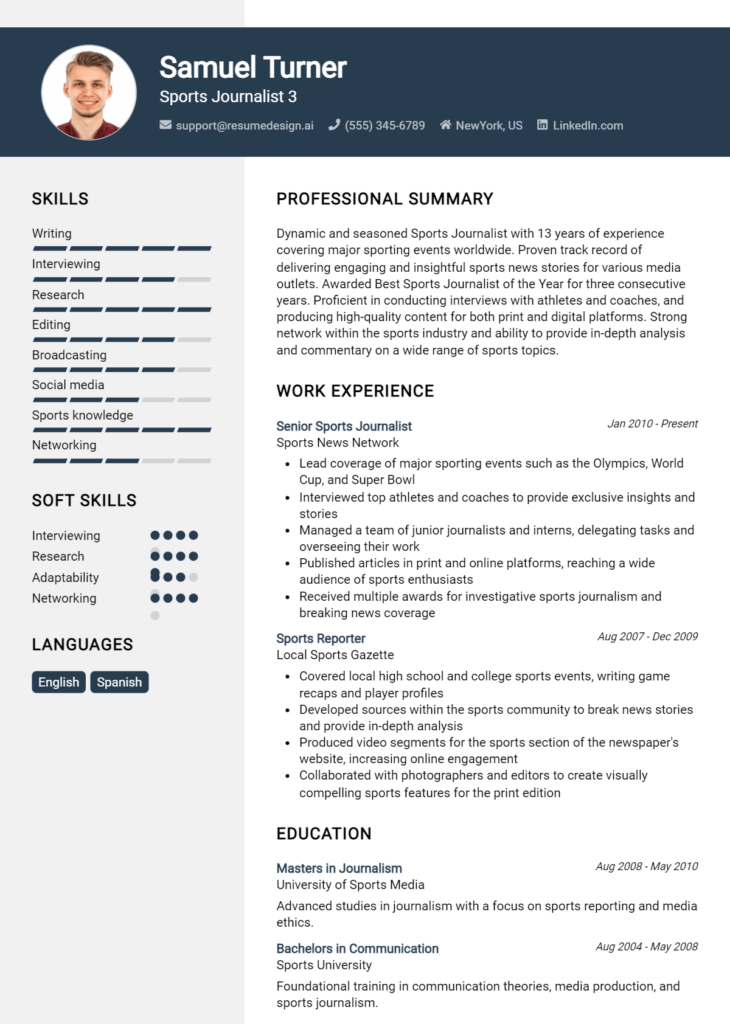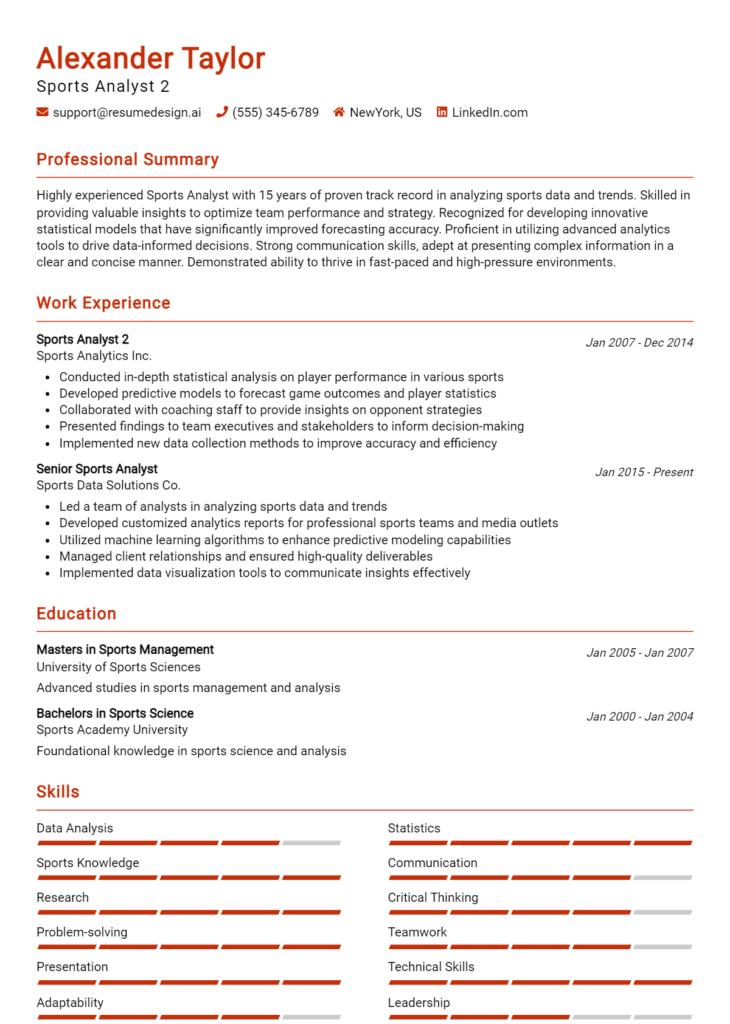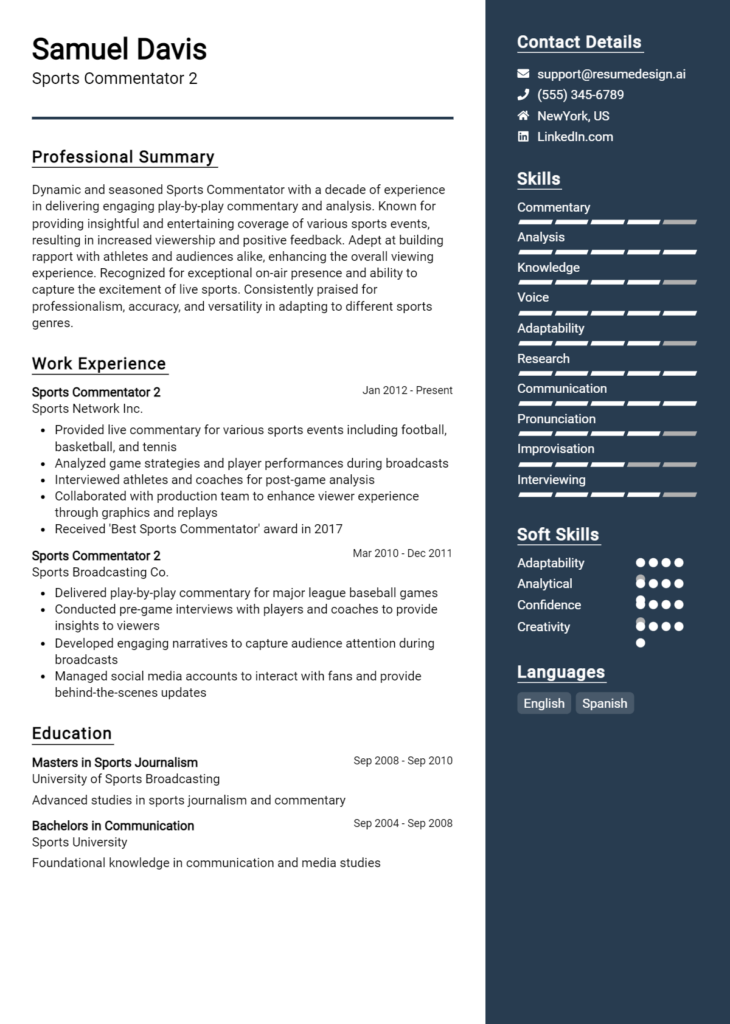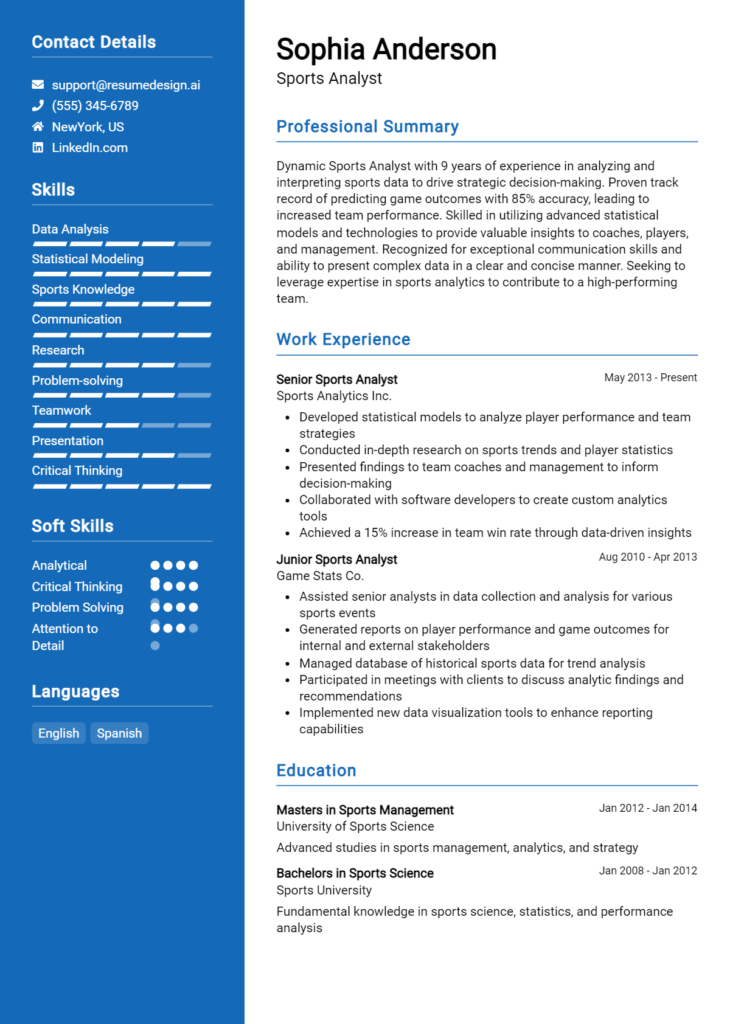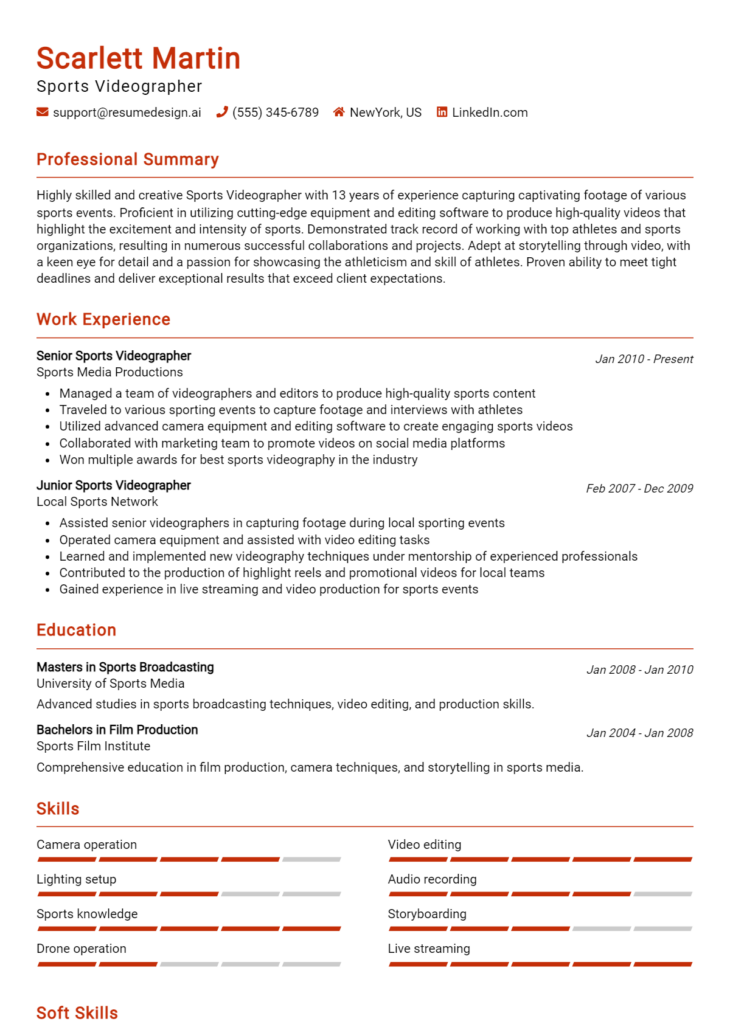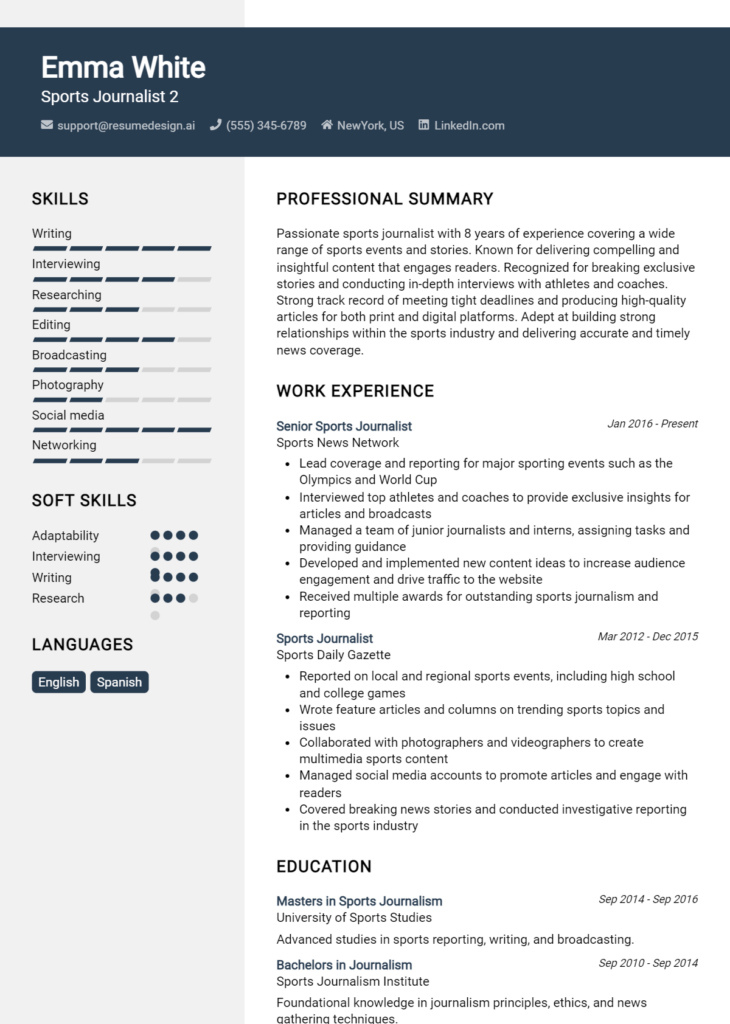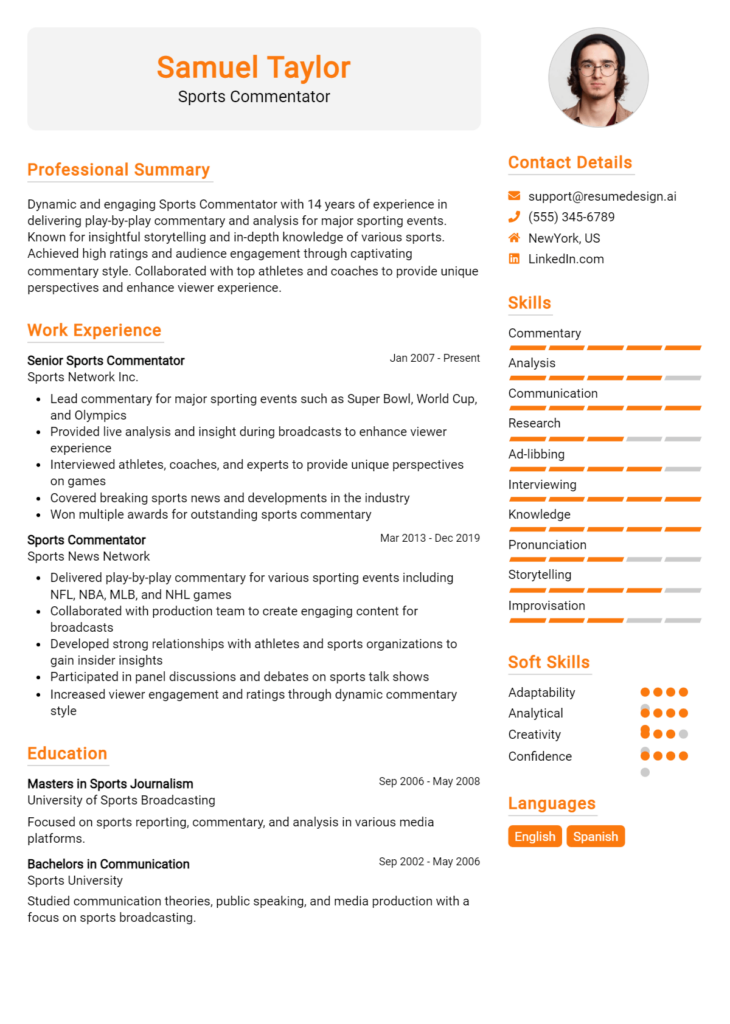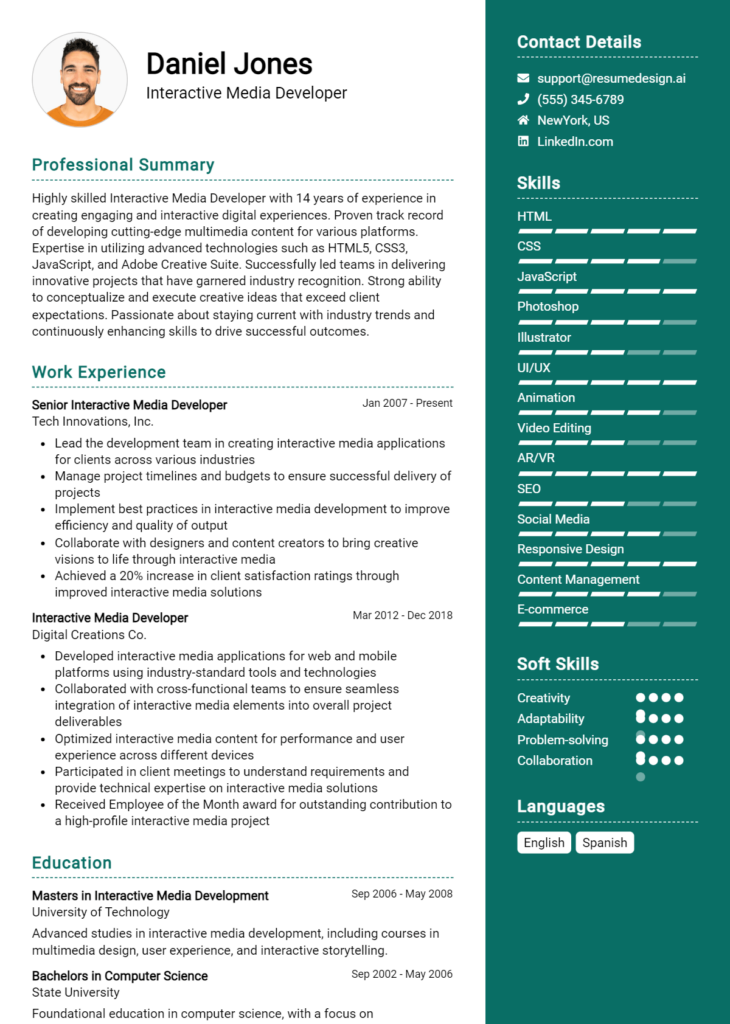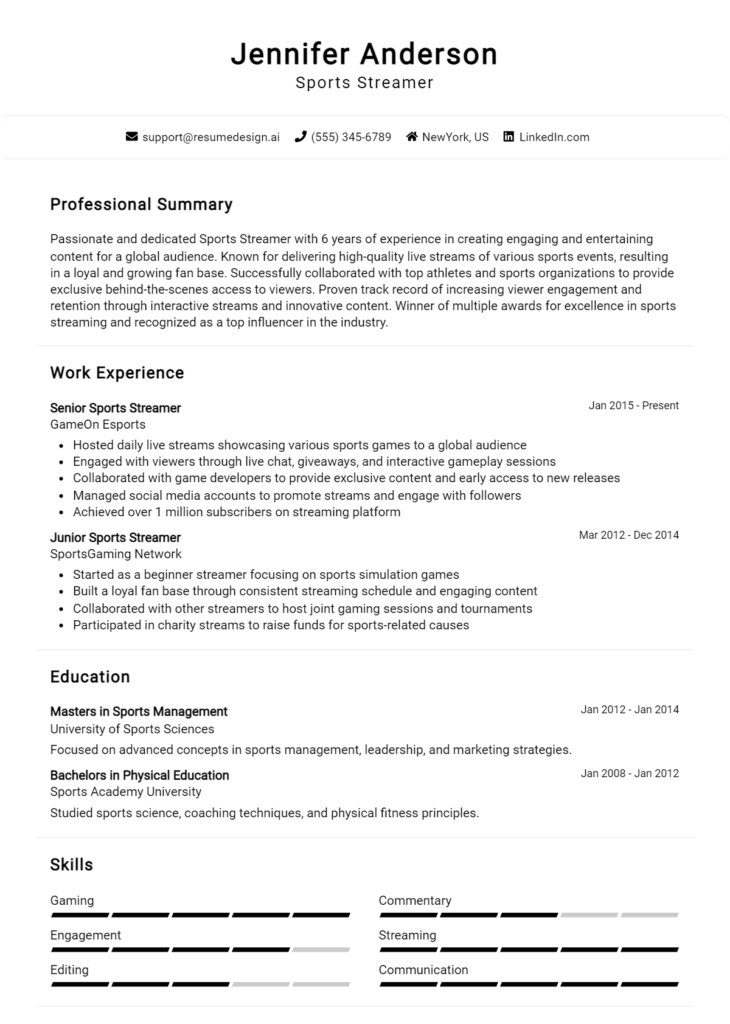Sports Photographer Core Responsibilities
A Sports Photographer plays a crucial role in capturing dynamic moments in sports, requiring a blend of technical expertise, creativity, and operational knowledge. They must possess strong problem-solving abilities to adapt to varying light conditions, fast-paced environments, and unpredictable events. Additionally, collaboration with marketing, editorial, and event management teams is essential to align visual storytelling with organizational goals. A well-structured resume can effectively highlight these skills, showcasing a candidate's qualifications and enhancing their attractiveness to potential employers.
Common Responsibilities Listed on Sports Photographer Resume
- Capture high-quality images during sporting events.
- Manage and maintain photography equipment.
- Collaborate with editors and marketing teams for visual content alignment.
- Process and edit photographs to meet publication standards.
- Attend pre-event briefings to understand key moments and athlete profiles.
- Develop a creative vision that enhances the storytelling of sports events.
- Establish relationships with athletes and coaches for better access and insights.
- Utilize social media platforms to share and promote photographic work.
- Adhere to deadlines for timely image delivery and publication.
- Stay updated with industry trends and advancements in photography techniques.
- Ensure compliance with copyright and licensing regulations.
High-Level Resume Tips for Sports Photographer Professionals
In the competitive field of sports photography, a well-crafted resume serves as a crucial tool for professionals looking to make their mark. As the first impression a candidate makes on a potential employer, the resume must effectively reflect both the unique skills and notable achievements that set them apart from the competition. A strong resume not only highlights technical abilities but also showcases a passion for sports and storytelling through imagery. This guide will provide practical and actionable resume tips specifically tailored for Sports Photographer professionals, helping you to present your best self to potential employers.
Top Resume Tips for Sports Photographer Professionals
- Tailor your resume to each job description by incorporating keywords and phrases that reflect the specific requirements of the position.
- Showcase relevant experience by highlighting past assignments, internships, or freelance projects that demonstrate your capability in capturing dynamic sports moments.
- Quantify your achievements by including metrics such as the number of events covered, publications in which your work has appeared, or the size of your audience on social media platforms.
- Highlight industry-specific skills such as proficiency with camera equipment, editing software, and knowledge of lighting techniques essential for sports photography.
- Include a portfolio link in your resume that showcases your best work and various sports events to give potential employers a visual representation of your talent.
- Utilize a clean and professional layout, ensuring that your resume is easy to read and visually engaging, reflecting your eye for composition.
- Incorporate any awards or recognitions you have received in the field, emphasizing your credibility and commitment to excellence in sports photography.
- List relevant educational background, including degrees or certifications that pertain to photography or sports journalism, to further enhance your qualifications.
- Network effectively by mentioning any collaborations with sports teams, organizations, or notable athletes that can help establish credibility and connections in the industry.
By implementing these tips, you can significantly increase your chances of landing a job in the sports photography field. A well-structured resume that effectively highlights your skills, experience, and passion for sports will resonate with hiring managers and set you on the path to success in this thrilling profession.
Why Resume Headlines & Titles are Important for Sports Photographer
In the competitive field of sports photography, a well-crafted resume headline or title plays a crucial role in capturing the attention of hiring managers. A strong headline serves as the first impression, summarizing a candidate's key qualifications in a single impactful phrase. It should be concise, relevant, and tailored specifically to the position being applied for. By effectively highlighting the photographer’s unique skills and experience, a compelling headline can set the stage for the rest of the resume, making it more likely to stand out in a crowded applicant pool.
Best Practices for Crafting Resume Headlines for Sports Photographer
- Keep it concise: Aim for one impactful phrase that encapsulates your expertise.
- Be role-specific: Tailor the headline to align with the specific sports photography position.
- Highlight key skills: Include specific skills that are relevant to sports photography, such as "action shots" or "event coverage."
- Incorporate achievements: Mention notable accomplishments that demonstrate your success in the field.
- Use strong action words: Start with powerful verbs to convey energy and professionalism.
- Avoid jargon: Ensure that the language is clear and understandable to all hiring managers.
- Reflect your style: Let your personality and artistic vision shine through in the wording.
- Update regularly: Revise your headline for each application to keep it relevant and fresh.
Example Resume Headlines for Sports Photographer
Strong Resume Headlines
Award-Winning Sports Photographer Specializing in Dynamic Action Shots
Experienced Sports Photographer with a Proven Track Record in Major Event Coverage
Creative Sports Photographer Skilled in Capturing Emotion and Storytelling Through Imagery
Weak Resume Headlines
Photographer Looking for Jobs
Sports Photography Professional
The strong headlines are effective because they immediately convey specific skills, experiences, and recognitions that set the candidate apart from others. They capture the essence of what makes the photographer uniquely qualified for the role. Conversely, the weak headlines fail to impress due to their vagueness and lack of detail, lacking the essential elements that would engage hiring managers and prompt them to explore the candidate's qualifications further.
Writing an Exceptional Sports Photographer Resume Summary
A well-crafted resume summary is crucial for a Sports Photographer, as it serves as the first impression a hiring manager will have of your qualifications. This brief overview should succinctly highlight your key skills, relevant experience, and notable accomplishments, making it easy for recruiters to grasp your suitability for the role at a glance. A strong summary can effectively differentiate you from other candidates, emphasizing your unique strengths and aligning them with the specific requirements of the job you are applying for. The goal is to be concise yet impactful, capturing attention and encouraging further review of your resume.
Best Practices for Writing a Sports Photographer Resume Summary
- Quantify your achievements: Use numbers to demonstrate your impact, such as the number of events covered, publications, or awards received.
- Focus on relevant skills: Highlight technical photography skills, editing software proficiency, and knowledge of sports dynamics.
- Tailor the summary for the job description: Customize your summary for each application to align with the specific requirements and responsibilities of the role.
- Use action verbs: Start sentences with strong action words to convey confidence and proactivity.
- Keep it concise: Aim for 3-5 sentences that get straight to the point without unnecessary fluff.
- Highlight experience with various sports: Mention the types of sports you’ve covered to show versatility and expertise.
- Showcase your creative vision: Emphasize your ability to capture compelling images that tell a story or convey emotion.
- Include awards or recognitions: Mention any accolades that showcase your talent and dedication to the craft.
Example Sports Photographer Resume Summaries
Strong Resume Summaries
Dynamic Sports Photographer with over 5 years of experience capturing high-energy moments in professional and amateur sports. Successfully covered over 200 events, resulting in a 30% increase in client engagement through social media. Proficient in Adobe Creative Suite and skilled in both digital and film photography.
Award-winning Sports Photographer specializing in action shots and post-game portraits, with a portfolio featuring major publications like Sports Illustrated and ESPN. Proven ability to produce high-quality images under pressure, having worked at over 50 live sporting events, enhancing brand visibility for clients by 40%.
Versatile Sports Photographer with a keen eye for detail and a passion for storytelling through imagery. Experienced in shooting a variety of sports, including soccer, basketball, and track and field, with a track record of delivering stunning visuals that led to a 25% increase in magazine subscriptions.
Weak Resume Summaries
I am a photographer who has experience in sports. I have taken pictures at many events and have a good understanding of photography.
Enthusiastic individual interested in sports photography. I enjoy capturing moments and have worked at a few sports events.
The strong resume summaries are effective because they provide specific examples of achievements, quantify results, and highlight relevant skills tailored to the job. They showcase the candidate's experience and expertise in a compelling manner that directly aligns with the needs of potential employers. In contrast, the weak summaries are vague and fail to provide any measurable outcomes or specific skills, making it difficult for hiring managers to assess the candidates' qualifications or potential contributions to their organization.
Work Experience Section for Sports Photographer Resume
The work experience section of a Sports Photographer's resume is crucial as it serves as a narrative of the candidate's journey in the field of sports photography. It highlights the technical skills acquired over time, the ability to manage and collaborate with teams, and the capacity to deliver high-quality photographic products under pressure. This section not only reflects the photographer's proficiency with equipment and technology but also demonstrates their success through quantifiable achievements, such as capturing significant moments or contributing to publications. Aligning past experiences with industry standards is essential for making a strong impression on potential employers.
Best Practices for Sports Photographer Work Experience
- Highlight specific technical skills, such as proficiency in DSLR cameras, lighting techniques, and editing software.
- Quantify achievements, such as the number of events covered or the increase in audience engagement due to your photography.
- Emphasize collaboration with athletes, coaches, and media teams to show teamwork abilities.
- Include details about the types of sports photographed to demonstrate versatility.
- Showcase your ability to work under pressure by detailing deadlines met during high-stakes events.
- Mention awards or recognitions received to validate your expertise and contributions.
- Describe your role in post-production processes to illustrate attention to detail and commitment to quality.
- Use action verbs to convey a sense of initiative and impact in previous roles.
Example Work Experiences for Sports Photographer
Strong Experiences
- Captured over 100 high-profile sporting events, leading to a 40% increase in publication readership.
- Managed a team of 5 photographers during a national championship, ensuring coverage of all key moments and achieving a 100% satisfaction rating from the client.
- Developed a unique editing style that resulted in a 30% faster turnaround time for published images, allowing for timely social media engagement.
- Collaborated with local sports teams to produce promotional materials, leading to a 25% increase in event attendance.
Weak Experiences
- Worked at various sports events and took pictures.
- Helped a team of photographers occasionally.
- Attended workshops on photography and sports.
- Took photos and submitted them to a publication.
The examples provided above illustrate the difference between strong and weak work experiences in a Sports Photographer's resume. Strong experiences are characterized by specific accomplishments, quantifiable outcomes, and a clear demonstration of technical and leadership skills. They showcase the photographer's ability to contribute meaningfully to projects and highlight collaborations that yield positive results. In contrast, weak experiences lack detail, specificity, and measurable impact, making it difficult for potential employers to assess the candidate's true capabilities or value in the field.
Education and Certifications Section for Sports Photographer Resume
The education and certifications section of a Sports Photographer resume is crucial in showcasing a candidate's academic background, industry-relevant qualifications, and commitment to continuous learning. This section not only reflects the candidate's formal education but also emphasizes specialized training and certifications that align with the demands of the sports photography field. By providing relevant coursework, recognized credentials, and evidence of ongoing professional development, candidates can significantly enhance their credibility and demonstrate their preparedness for the role they are pursuing.
Best Practices for Sports Photographer Education and Certifications
- Include only relevant degrees and certifications that directly apply to sports photography.
- List educational institutions and certification bodies with a brief description of the program or course.
- Highlight any specialized training in photography techniques, sports media, or digital editing software.
- Incorporate relevant coursework that demonstrates knowledge of sports, photography, and visual storytelling.
- Use clear and concise language to describe certifications and their relevance to the job role.
- Prioritize industry-recognized credentials to enhance your professional standing.
- Update the section regularly to reflect any new certifications or courses taken.
- Consider including relevant workshops or seminars to showcase ongoing education in the field.
Example Education and Certifications for Sports Photographer
Strong Examples
- Bachelor of Fine Arts in Photography, University of Arts, 2021
- Certified Professional Photographer (CPP), Professional Photographers of America, 2022
- Sports Photography Workshop, National Press Photographers Association, 2023
- Advanced Digital Editing Techniques, Online Photography Academy, 2022
Weak Examples
- Bachelor of Arts in History, State University, 2018
- Certificate in Basic Photography from a non-accredited institution, 2015
- High School Diploma, Graduated 2016
- Outdated Adobe Photoshop Certification, 2010
The strong examples are considered relevant because they directly pertain to the field of sports photography, showcasing both formal education and recognized certifications that reflect the candidate's expertise. In contrast, the weak examples highlight irrelevant educational backgrounds and outdated qualifications, which do not contribute to the candidate's suitability for a sports photography role. By focusing on pertinent credentials, candidates can effectively communicate their qualifications and stand out in a competitive job market.
Top Skills & Keywords for Sports Photographer Resume
A well-crafted resume for a Sports Photographer is crucial in showcasing both technical proficiency and personal attributes that are essential in this dynamic field. Highlighting the right skills can set you apart from the competition and demonstrate your ability to capture the essence of sporting events. Employers look for a blend of hard and soft skills that reflect your technical expertise in photography as well as your ability to communicate, work under pressure, and adapt to fast-paced environments. The right combination of these skills will not only enhance your resume but also increase your chances of landing your desired position in the competitive world of sports photography.
Top Hard & Soft Skills for Sports Photographer
Hard Skills
- Proficient in DSLR and mirrorless camera systems
- Expertise in photo editing software (Adobe Photoshop, Lightroom)
- Understanding of lighting techniques and equipment
- Knowledge of composition and framing for dynamic shots
- Experience with remote cameras and sports-specific gear
- Proficiency in color correction and retouching
- Familiarity with different photography styles (action, portrait, candid)
- Ability to shoot in various weather conditions
- Understanding of digital asset management
- Knowledge of sports rules and regulations to capture key moments
Soft Skills
- Strong communication skills to liaise with athletes and teams
- Excellent time management to meet tight deadlines
- Ability to work well under pressure during live events
- Creative thinking to capture unique perspectives
- Strong attention to detail for perfecting shots
- Flexibility and adaptability to changing environments
- Team-oriented mindset for collaborating with other professionals
- Strong observational skills to anticipate important moments
- Customer service skills for client interactions
- Passion for sports to drive motivation and engagement
For further insights on enhancing your resume with the right skills and detailing your work experience, consider the importance of these components in building a compelling narrative of your professional journey.
Stand Out with a Winning Sports Photographer Cover Letter
Dear [Hiring Manager's Name],
I am writing to express my interest in the Sports Photographer position at [Company Name], as advertised on [where you found the job listing]. With over [X years] of experience in dynamic sports photography and a passion for capturing the raw emotion and intensity of athletic competition, I am excited about the opportunity to contribute my expertise to your esteemed team. My portfolio, which includes work with [mention any notable teams, events, or publications], showcases my ability to deliver stunning images that resonate with both fans and athletes alike.
What sets me apart as a sports photographer is my commitment to storytelling through imagery. I thrive in fast-paced environments, adeptly anticipating moments that encapsulate the spirit of the game. Whether it’s a dramatic last-minute goal or a victorious celebration, I have honed my skills in both action shots and candid moments. Additionally, my proficiency with high-end camera equipment and editing software ensures that I can deliver high-quality images that meet deadlines without compromising artistry.
I believe my collaborative nature would make me a valuable asset to the [Company Name] team. I understand the importance of working closely with coaches, athletes, and other media professionals to create a cohesive narrative around sporting events. My goal is not just to capture images but to elevate the overall experience of the audience and the athletes themselves. I am eager to bring my unique perspective and creativity to your organization and help showcase the thrilling world of sports through my lens.
Thank you for considering my application. I look forward to the opportunity to discuss how my background, skills, and enthusiasms align with the vision of [Company Name]. I am excited about the possibility of contributing to your team and helping to portray the electric energy of sports through captivating photography.
Sincerely,
[Your Name]
[Your Phone Number]
[Your Email Address]
[Your Website or Portfolio]
Common Mistakes to Avoid in a Sports Photographer Resume
When applying for a position as a sports photographer, your resume plays a crucial role in showcasing your skills, experience, and unique style. However, many applicants make common mistakes that can undermine their chances of landing an interview. Understanding these pitfalls can help you create a compelling resume that highlights your strengths and sets you apart from the competition. Here are some common mistakes to avoid when crafting your sports photographer resume:
Ignoring Tailoring: Sending out a generic resume fails to highlight how your specific skills and experiences align with the job description. Always customize your resume for each application to demonstrate your fit for the role.
Lack of Clear Focus: A resume that tries to cover too many areas can dilute your message. Focus on your strengths as a sports photographer, emphasizing relevant experiences and skills that pertain to sports photography specifically.
Inadequate Portfolio Links: Failing to include links to your portfolio or online galleries diminishes your resume's impact. Always provide easy access to your best work to give potential employers a glimpse of your style and capabilities.
Overly Technical Jargon: Using excessive technical terms without context may alienate those reading your resume. While showcasing your technical skills is important, ensure that your language is accessible and conveys your expertise clearly.
Neglecting Soft Skills: While technical proficiency is crucial, soft skills like teamwork, communication, and adaptability are equally important in sports photography. Highlight experiences that showcase these attributes to provide a well-rounded view of your capabilities.
Poor Formatting: A cluttered or unprofessional layout can make your resume difficult to read. Use a clean, organized format with consistent fonts and spacing to enhance readability and make a strong first impression.
Missing Quantifiable Achievements: Failing to include metrics or specific achievements can leave your accomplishments vague. Whenever possible, quantify your achievements (e.g., "Photographed over 50 sporting events" or "Increased social media engagement by 30% through photography").
Spelling and Grammar Errors: Typos and grammatical mistakes suggest a lack of attention to detail, which is critical in photography. Always proofread your resume multiple times or have someone else review it to ensure professionalism.
Conclusion
As a sports photographer, your resume should reflect your unique skills, experiences, and passion for capturing the dynamic energy of athletic events. Highlight key aspects such as your proficiency in using photography equipment, your ability to work in fast-paced environments, and your understanding of sports dynamics. Additionally, showcasing your portfolio can significantly enhance your resume by providing visual evidence of your capabilities.
It's essential to tailor your resume for each opportunity, ensuring it aligns with the specific requirements of the job you're applying for. Include relevant work experiences, such as internships, freelance projects, or collaborations with sports teams, and emphasize any awards or recognitions you've received in the field.
To ensure your resume stands out, consider utilizing professional tools designed to enhance your application. Explore various resume templates that can help you format your information effectively. You can also use a resume builder to create a polished and professional document quickly. For inspiration, check out resume examples that illustrate how to present your skills and experiences compellingly. Additionally, don't overlook the importance of a strong cover letter; check out our cover letter templates to make sure your introduction is just as impactful as your resume.
Now is the perfect time to review and update your Sports Photographer resume. Take advantage of these resources and ensure your application reflects your best self. Get started today!

